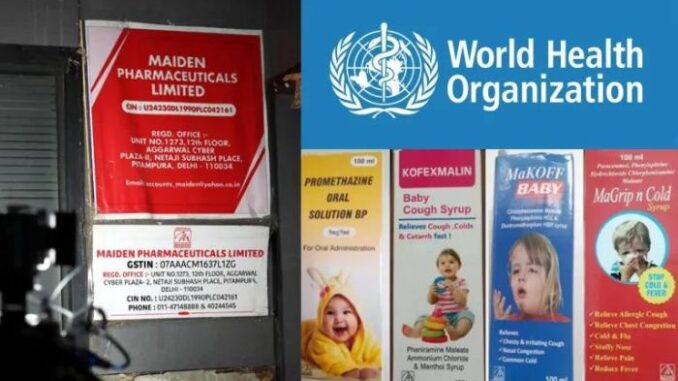
In a recent development that has raised concerns in the healthcare sector, the World Health Organization (WHO) has flagged seven syrups manufactured in India in a list of medicines linked to global deaths. The inclusion of these syrups in the WHO’s list signifies a potential threat to public health and calls for immediate action from regulatory authorities.
According to the WHO report released yesterday, the seven syrups have been found to contain ingredients that could lead to severe adverse reactions, including fatalities, when consumed without proper medical supervision. The WHO emphasized that these medicines should be strictly monitored and prescribed only under the guidance of qualified healthcare professionals.
While the WHO report does not disclose the specific names of the flagged syrups, it states that they are commonly used in the treatment of various ailments, particularly in pediatric cases. The organization has urged national health agencies to investigate the matter thoroughly and take appropriate measures to ensure the safety of patients.
India, being one of the largest manufacturers and exporters of pharmaceuticals worldwide, plays a significant role in the global drug supply chain. The identification of these potentially dangerous syrups has prompted concerns about the quality control and regulatory processes within the Indian pharmaceutical industry.
The Indian government has responded swiftly to the WHO’s warning, establishing a task force comprising experts from the Ministry of Health and the Drug Controller General of India (DCGI). The task force will conduct a comprehensive investigation into the flagged syrups, including tracing their distribution channels, examining manufacturing practices, and analyzing the adverse events reported by patients.
The DCGI has also directed all pharmaceutical companies involved in the production of the flagged syrups to suspend their manufacturing until further notice. Additionally, the government has imposed stringent regulatory measures on the sale and distribution of these medicines to prevent any potential harm to patients.
Indian pharmaceutical companies have expressed their commitment to cooperating fully with the authorities in the investigation and ensuring the safety of their products. Industry leaders have emphasized the need for stricter quality control protocols and the implementation of internationally recognized standards across the sector to maintain the country’s reputation as a reliable supplier of medicines.
The global medical community is closely monitoring the situation, with many countries reviewing their import regulations and strengthening their pharmacovigilance systems to prevent the entry and distribution of substandard or dangerous medicines.
The WHO has called for international collaboration and exchange of information to address this issue effectively. It has stressed the importance of strengthening regulatory systems and quality control measures across all stages of the drug manufacturing process to safeguard public health and prevent similar incidents in the future.
As the investigation progresses, regulatory authorities worldwide are expected to implement stricter measures to ensure the safety and efficacy of medicines reaching patients, while the Indian pharmaceutical industry works towards enhancing its quality control mechanisms and restoring confidence in its products.







